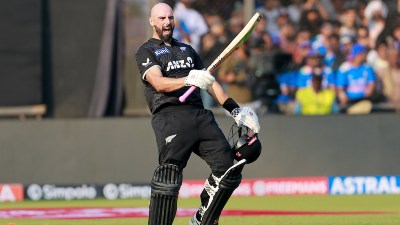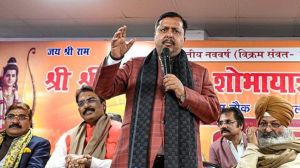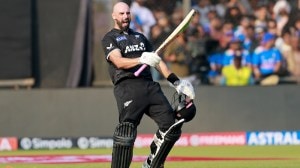Dreams after Darkness
They are the children of the Dark Decade. But they preach peace. One is the son of the man who was at the helm of it all, the larger-than-li...

They are the children of the Dark Decade. But they preach peace. One is the son of the man who was at the helm of it all, the larger-than-life saint who inspired a Jihadi zeal. There are others who became his weapons. Driven by hurt and hatred, they took up arms. Putting at stake their present, their future, their everything. Then, there are those who8217;re living in the shadow of a father, who, fired by the collective angst of a community, gunned down the Prime Minister he was supposed to protect before being shot himself.
They are the bright present of a dark past. Looking at them, it8217;s difficult to rustle up the blood-spattered images of the trouble-torn Punjab. It8217;s painful to resurrect the lost years when peace flew out of the window and guns reigned. When as a Centre-State skirmish in the early 8217;80s snowballed into a bloody crusade for a separate nation. Intransigent politicians, a back-to-the-wall police force, and fanatical ideologues together pushed Shahid Bhagat Singh8217;s land into an abyss. The botched-up Operation Bluestar and 8217;84 riots seemed to further wipe out any chances of normalcy by completing the alienation of the Sikh masses 8212; a goal the bigots had long strived to achieve.
The tide of hatred swept away hundreds of youths. A militant was born every other day. And the killings became a mere numbers game. But somewhere along the line, the cause was washed away by blood, the ideology lost its lustre. And peace tip-toed back into Punjab.
Cut to the present and you will find it nestling with the children of the Dark Decade.
The Sant8217;s Son
HIS father could launch a hundred dharam yudhs. He was a wizard with words. Words which could make people kill or die. Ishar Singh, the elder son of Sant Jarnail Singh Bhindranwale, is a shy guy. Like his mother. 8216;8216;My younger brother Inderjit is a spitting image of my father,8217;8217; he offers, obviously ill at ease with journalists. Unlike his father, whom he never got to know.
8216;8216;I was only five when he left home for Damdami Taksal in 8217;77,8217;8217; he looks out of the window. From then on, he was santji to them and the world. 8216;8216;Whenever he visited us, it was with his jatha,8217;8217; he says, taking you back to the days when his father, a silver barchchi in hand, strode like a raging colossus over Punjab.
Today, he sits framed on the wall, looking down upon his son, who is as removed from the religio-political affairs as he, an ideologue, was from real estate. Ishar is a realtor, has been since 8217;97. 8216;8216;I have some friends who invested in my business,8217;8217; he says, lighting up as his two children walk in, wearing big smiles. They are the reason for his change of tack, from farming to property-dealing.
His education was cut short by his father, who plucked him from his village school to transplant him in Mahant Jagir Singh8217;s akhara to learn gurbani, when he was in Class VI. A few months on, Operation Bluestar ended his father8217;s reign on Golden Temple with death. Those were traumatic times. 8216;8216;He may have been a sant for the others, but mere te baap si he was my father,8217;8217; he swallows.
From then on, the 12-year-old scripted his own destiny. He went back to school but it wasn8217;t easy. 8216;8216;God knows how I completed Plus Two,8217;8217; he wrings his hands, telling you about his first encounter with the police when he was in Class X. 8216;8216;They picked me up just like that.8217;8217; He had a dream: to be a doctor but circumstances killed it. 8216;8216;Don8217;t worry, I8217;ll fulfil it through my children,8217;8217; he waves away sympathy.
Political shenanigans, too, leave him cold. You wonder aloud if it has something to do with his father and he looks shocked. 8216;8216;No, I don8217;t stand judgement on my father. He was a man of convictions. I am proud of him.8217;8217;
Playing at Grown-Ups
FEAR has been their childhood companion. It walked into their lives on October 31, 1984. 8216;8216;We returned from school to chaos. Our daadi was cowering in a corner with our baby brother Jassi in her lap. There was a sea of khaki in our house.8217;8217;
Amrit was in Class III and Sarabjeet in Class II when their life was turned upside down by a hail of bullets fired by their father, Inspector Beant Singh, at Prime Minister Indira Gandhi.
Their mother Bimal Kaur Khalsa, a nurse at Lady Hardinge College, did not return for days. And they never saw their father again. 8216;8216;We were treated as outcasts when we shifted to Kharar; people had no time for us,8217;8217; remembers Sarabjeet.
To add to their woes, an incendiary speech in a gurdwara landed their mother behind bars for two full years. 8216;8216;We didn8217;t have what you could call a normal life,8217;8217; the pretty Amrit smiles, tickled perhaps by the understatement.
8216;8216;No one gave a damn for us. Neither the leaders, nor our family except for our chachaji. Were it not for our house at Mohali, a portion of which we rented out, and my mother8217;s savings, we would have starved,8217;8217; Amrit lets her anger bubble over. The Damdami Taksal paid for their education, but only for two years. Amrit had barely come of age when she married Harinder, a computer professional. That was in 8217;96. The marriage gave the three the emotional security they had yearned for. The brothers started a cyber cafe with Harinder, who runs a computer business, but ran into losses. 8216;8216;The overheads were very high,8217;8217; sighs Sarabjeet. Now, he8217;s set up a cable business. 8216;8216;They8217;re trying hard, all they need is an initial push,8217;8217; says the worried Amrit.
On this note, you turned to Jassi, the quiet one. There he sat, the shy, 19-year-old wannabe lawyer weeping silently as you clinically, brutally, ripped open all his wounds, one by one.
The Man Who Would Be Assassin
KARAMJIT Singh Sunam is a well-known name in Sunam. One, because he attempted to assassinate then Prime Minister Rajiv Gandhi in 8217;86, and two, he is the principal of Guru Harkrishan Public School.
Karamjit8217;s life can be divided into before and after: before October 2, 1986, and after May 2, 2000. 8216;8216;But it was 1984 that changed my destiny,8217;8217; says the lanky man. He was working as a salesman in Delhi when the November 8217;84 riots shook his core. 8216;8216;It was like an invasion,8217;8217; he shudders. Rajiv Gandhi8217;s statement likening it to the tremors caused by a big tree8217;s fall was the final straw. 8216;8216;I resolved then and there to avenge the massacre,8217;8217; Karamjit recalls.
The 24-year-old spent months trailing Rajiv through newspapers. Getting a weapon was also no mean task. 8216;8216;I finally visited Sri Ganganagar to buy a country-made revolver for Rs 300,8217;8217; he remembers. Finally, on Gandhi Jayanti, 1986, after hiding in the bushes for 10 days, he struck, attempting to kill Rajiv Gandhi at Raj Ghat. He failed and was sent to jail for 14 years.
He came out in the summer of 2000. The world had changed. 8216;8216;I8217;d lost my mother, my brother, the resentment had vanished8230; it was unbelievable.8217;8217; Karamjit too had changed. The prison could shackle his body, not his mind. 8216;8216;I completed my graduation and post-graduation in History in the prison, and was starting on my PhD on Banda Bahadur when I was freed,8217;8217; says Karamjit.
The school was a dream he8217;d nurtured during the long years spent in solitary confinement. He turned it into reality soon after coming home. 8216;8216;Today, I have 370 students,8217;8217; he beams, showing you around his multi-storied school with wife Bhagwant by his side.
Nudge him back to the Dark Decade and he waves a hand. 8216;8216;It8217;s over. I did what I had to do, but it8217;s different now.8217;8217;
His eyes are fixed firmly on the future. And on a lawyer8217;s black robes.
Switching Sides
8216;8216;It was a strong wave which swept us away,8217;8217; he says, taking you back to the days when Punjab first began rumbling with discontent. Valtoha was 16, a scholarship-winner, who found himself drawn to the All India Sikh Students8217; Federation AISSF and the strident Damdami Taksal. By 1982, he8217;d been appointed an office-bearer. Whispers that he was the blue-eyed boy of none other than Sant Jarnail Singh Bhindranwale only made him soar higher. Two years later, he was grounded by Operation Bluestar, and bundled off to Jodhpur jail. For eight years.
It8217;s a chapter of his life he likes to skim over. But he does let you know that the struggle couldn8217;t achieve much even though the issues were relevant. 8216;8216;We lost more than we gained. Anyone who saw it from within will tell you about the bitterness that seeped in.8217;8217;
The days of guerrilla warfare, he declares, are over. Which is why he took to politics soon after his release. Today he is an executive member of the Akali Dal. He was also a member of the Punjab Subordinate Services Selection Board appointed by former Chief Minister Parkash Singh Badal.
But politics, he says, is not what he had planned for himself, and there are times when he wishes things could be different. 8216;8216;I was a brilliant student, I could have pursued any career if only there was someone to guide me.8217;8217;
Now, he and his wife, an English lecturer, are making sure their eight-year-old son has a wealth of options. 8216;8216;You know, he wants to be the Prime Minister,8217;8217; the proud father roars.
- 01
- 02
- 03
- 04
- 05































